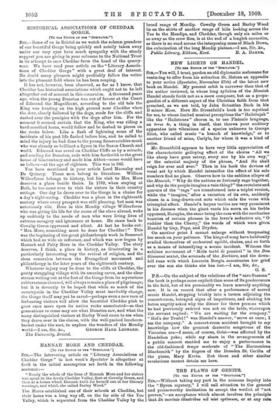NEW LIGHTS ON HANDEL.
[To Tar Erma or TEE " BricrAroz.")
Sin,—You will, I trust, pardon an old diplomatic melomane for venturing to offer from his suburban St. Helena an appendix to your notice (Spectator, November 27th) of the latest new book on Handel. My present orbit is narrower than that of the author reviewed, in whose long syllabus of the Messiah Handel stands forth not as a mere composer, but as a propa- gandist of a different aspect of the Christian faith from that preached, as we are told, by John Sebastian Bach in his B minor Mass. Here Mr. Stres.tfeild's book is too mystical for me, to whose limited musical perceptions the "Hallelujah" like the "Hailstones" chorus is, to use Platonic language, an grrws 6r, a thing in itself, that throws your auditory apparatus into vibrations of a species unknown to George Eliot, who called music "a branch of knowledge," or to another friend of mine, Carlyle, for whom it was a kind of noise.
Mr. Streatfeild appears to have very little appreciation of the characteristic galloping effect of the chorus "All we like sheep have gone astray, every one by his own way," or the celestial majesty of the phrase, "And He shall reign for ever and ever." Then in his book the devices of vocal art by which Handel intensifies the effect of his solo numbers find no place. Observe how in the sublime allegro of the Messiah, "Why do the nations so furiously rage together, and why do the people imagine a vain thing?" the crotchets and quavers of the "rage" are transformed into a triplet version, while the "imagine," after a variation of its own, suddenly closes in a long-drawn-out note which ends the verse with triumphal effect. Handel's larynx tactics are very prominent in his Samson when the giant vents his scorn on his feeble opponent., Harapha, the same being the case with the saccharine beauties of certain phrases in the lover's seductive air, "0 ruddier than the Cherry," the words of which were given Handel by Gay, Pope, and Dryden.
On another point I cannot enlarge without trespassing too much on your patience. The kings of song have habitually availed themselves of orchestral agaild, shakes, and so forth as a means of intensifying a scenic incident. Witness the sublime movement of "Mile torbi di pensieri " in the Don Giovanni sextet, the serenade of the Barbiere, and the down- hill runs with which Lucrezia Borgia accentuates her grief over the son she thinks she has lost.—I am, Sir, &c., G. S.
P.S.—On the subject of the relations of the " caro Sassone" the book is perhaps more explicit than some of its predecessors in the field, but of his personality we learn scarcely anything new. It is on record that after a performance of sacred music Handel, stepping briskly into a tavern adjoining the concert-room, betrayed signs of impatience, and shaking his baton angrily asked why the dinner for three persons which he had previously ordered was not on the table, whereupon the servant replied : "We are waiting for the company." "Hors der Teufel I" was Handel's answer, "serve at once ; I am the company." A concert-room accident brought to my knowledge how the greatest dramatic songstress of the Victorian era—I mean, of course, Griai—was affected by the liandelian yoke ; while my share in the arrangements of a public concert enabled me to enjoy a performance in the old-fashioned tempo moderato of "The Harmonious Blacksmith" by the fingers of the Dresden St. Cecilia of the piano, Mary Krebs. But these and other similar revelations cannot detain me here.


















































 Previous page
Previous page